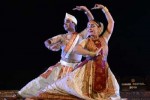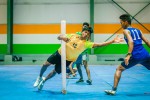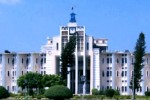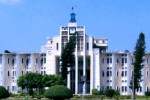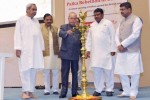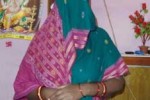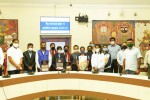A fifth Asian Athletics Championship gold medal for Dilshod Nazarov (Tajikistan), a dramatic high jump victory for Woo Sang-Hyeok (South Korea), a maiden Asian gold for steeplechaser Sudha Singh and a victory for the Chinese men’s 400 relay squad by the barest of margins were the highlights of the third night of competition in the AAC2017 at the Kalinga Stadium here on Saturday.
The Rio Olympic Champion Dilshod Nazarov completed a hat-trick, having won gold at AAC in Amman 2007, Guanghzou 2009, Pune 2013 and Wuhan 2015 besides three Asian Games crowns in Doha 2006, Guangzhou 2010 and Incheon 2014. He was a picture of consistency as he dominated the field.

Here’s how the evening’s finals panned out:
Men’s 110m hurdles final: Two-time AAC silver medallist Abdulazia Al-Mandeel made light of the being one of the slowest reaction times at the start to sustain his good form from the semifinal heats into the final to win gold this time in a time of 13.50 seconds. His Kuwaiti team-mate, Yaqoub Al-Youha beat back a game challenge by Saudi Arabia’s Ahmed Khader to win silver two-hundredths of a second ahead. Khader appeared to have resolved to stay abreast of the Kuwaiti on his left and ahead of the Japanese Shun-Ya Takayama and that tactic earned him bronze. India’s Siddharth Thingalaya made a gallant effort but had to settle for the fifth place in 13.72 ahead of two Chinese-Taipei hurdlers and Japan’s Wataru Yazawa.
Men’s 400m hurdles final: Eric Shauwn Cray, the US-born Filipino whose request to be allowed to compete for his mother’s home nation was approved in 2013, breezed to victory in 49.57 seconds in what was among the more open competitions in AAC2017. Chinese Taipei’s Chen Chieh, who win the semifinal heats ahead of his competitor, also dipped in under 50-seconds but had to settle for silver. There was a wonderful surprise for fans at the Kalinga Stadium as MP Jabir, 21, came up with a personal best of 50.22 to earn him bronze medal in a race that saw defending champion Yuta Konshi (Japan) finish in eighth place.
Men’s 3000m steeplechase final: India’s Naveen Kumar, a bronze medallist in the 2014 Asian Games, raised the hopes of the throaty audience at the Kalings Stadium by doing some front-running in the early half of the race. But Hossain Keyhani (Iran), Qatari teenager Yaser Salem, his compatriot Hashim Salah Abbas and Saudi Arabia’s Ali Ahmed Al-Amri pulled away with a couple of laps left. The 27-year-old Iranian found the reserves on a humid night to surge ahead of the others and break the beam in 8:43.82, the meet record standing in the name of Qatar’s Khamis Saifeidin not being threatened at all. Naveen Kumar finished seventh in 9:02.95
Men’s 4x100m relay final: With Continental record holder Japan and Qatar not fielding squads, China and Thailand were expected to deliver fireworks in the last final of the day – and deliver they did, only the photo finish camera awarding victory to China. Both teams were credited with 39.38 seconds, the camera declaring that the China’s anchor Xu Haiyan had finished one-thousand of a second ahead of his Thai counterpart Jaran Sathoengram. Hong Kong took the bronze, egding out Sri Lanka by 0.06 seconds.
Men’s high jump final: Former World Youth Champions Woo Sang-Hyeok (South Korea) stole a dramatic victory over the flamboyant world championship silver medallist, Zhang Guowei (China). The 21-year-old Korean appeared to be finding it hard to secure a rhythm, needing two attempts over 2.24m and three attempts each when the bar was raised to 2.28 and 2.30m. By contrast, the showman in Zhang Guwoei seemed to enjoy playing to the gallery while clearing all four heights up to 2.24m on first attempt. At 2.28, he needed a second and kept toppling the bar over with his heel when it was at 2.30. He sank on all fours while a short distance away, the Korean broke into a wide smile.
Men’s hammer throw final: Olympic champion Dilshod Nazarov trailed a determined Chinese Wang Shizhu, seven years his junior, after the second round of throws and then uncorked a throw over 75m to settle any doubts and to justify the favoruitism. The genial 37-year-old, President of the Tajikstan Athletics Federation, followed that up with two more throws over 75m, finishing with his best, 76.69m. Wang Shizu tried very hard and that led to three foul throws before he settled for silver. South Korea’s Lee Ywun-Chul packed all his will and physica strength behind a final throw in a bid to get to silver medal position but the ball and chain landed an agoinising four centimeters short of the Chinese’s mark on a night that saw a dozen throws over 70m.
Women’s 100m hurdles final: South Korea’s Jung Hye-Lim made it a start-to-finish affair in the final, leaving the 2013 Asian champion Ayako Kimura in her wake. China’s Wang Dou took bronze in a race that belied expectations of a sub-13 second time. Jung Hye-Lim, who had won silver six years ago in Kobe, glided over each hurdle smoothly with power and grace. With the Japanese ace trailing her in the lane alongside her, the South Korean did not have to find that extra gear to drive to a sub-13 time. She would take the gold medal rather than risk injury. Ayako was timed 13.30 while Wang Dou finished in 13.36. Uzbekistan’s Valentina Kibalnikova and Japan’s Hitomi Shimura took the fourth and fifth places.
Women’s 400m hurdles final: Vietnam’s Nhuyen Thi Huyen, a former Asian Junior Champion, broke free of the pack at the end of the bend into the home stretch and won gold in style in 56.14 second. India’s Anu Raghavan, fourth in Wuhan AAC 2015, dug deep into the reserves of her strength to claim the silver ahead of Japanese veteran Sayaka Ayoki in a personal best time of 57.22.
Women’s 3000m steeplechase final: After running in the company of others Sudha Singh, 31, decided she had her goals to achieve and sped off in pursuit of that sub-10-minute time to complete her return to international stage with a creditable victory in 9:59.47. She this added gold to her three silver AAC medals earned in 2009, 2011 and 2013. For someone who was away from training for several months after she being down with swine flu on her return from the Olympic Games in Rio de Janiero last year, she posted 10:03.01 in the heat of Patiala. North Korea’s 18-year-old Hyo Gyong claimed silver a good 14 seconds and more behind Sudha Singh and five seconds ahead of Japan’s Nana Sato.
Women’s 4x100m relay final: The cumulative speed of Kazakhstan’s quartet – Rima Kashafutdinova, Viktoriya Zyabkina, Merdzhan Ishangulyeva and Olga Safronova – was just too hot for the Chinese. It did not seem to matter that Merdzhan Ishangulyeva had finished her 400m hurdles in fourth place only a short while ago. For, the Kazakh strategy getting their two best sprinters to do duty on the straights paid rich dividends as the team was home in 43.53 seconds. The defending champion obviously had a different squad this time – Sun Fengyan, Kong Lingei, Lin Huijun and 17-year-old Feng Lulu – but it was no less determined, having not fielding any of them in the women’s 100m run. India’s Merlin Joseph, Himashree Roy, Srabani Nanda and Dutee Chand beat Thailand to the bronze with a time of 44.57 seconds.
Women’s Triple jump final: Kazakhstan’s 18-year-old Mariya Ovchinnikova made a memorable debut in the senior ranks in AAC with a narrow victory over her senior compatriot, three-time AAC bronze medallist Irina Ektova. Mariya Ovchinnikova, who logged 13.94m, and Irina Ektova, 13.77 on June 24, sustained their top form with five jumps over 13.50m that no other competitor managed. The teenager’s 13.72m on her fifth effort gave her a 10cm advantage over her 30-year-old team-mate. India’s NV Sheena impoved on her season’s best showing by 11cm on her final jump and claimed bronze ahead of Sri Lankan Vidhusha Lakshani.
Heptathlon (after four events): With 3443 points, Swapna Barman held on to her lead after the 200m, the fourth and final event on the opening day. A slow 26.11-second showing in the 200m saw her lead over team-mate, Odisha favourite and AAC 2015 bronze medallist Purnima Hembram (24.86 seconds in 200m) whittle down to just 11 points. Japan’s Meg Hemphill also closed in on Swapna Baraman with a 25.06-second run. She now has 3410 points. The second day’s events, long jump, javelin throw and 800m, will determine the colour of the medals for each of these competitors, or so it appears.
Source: www.odisha2017.games






